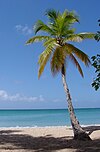Nannorrhops
| Nannorrhops | |
|---|---|

| |
| Scientific classification | |
| Kingdom: | Plantae |
| Clade: | Tracheophytes |
| Clade: | Angiosperms |
| Clade: | Monocots |
| Clade: | Commelinids |
| Order: | Arecales |
| Family: | Arecaceae |
| Subfamily: | Coryphoideae |
| Tribe: | Chuniophoeniceae |
| Genus: | Nannorrhops H.Wendl. |
| Species: | N. ritchiana
|
| Binomial name | |
| Nannorrhops ritchiana | |
| Synonyms[1] | |
| |
Nannorrhops ritchiana, the Mazari palm, is the sole species in the genus Nannorrhops in the palm family Arecaceae.
Distribution
[edit]It is native to southwestern Asia, in the historical region of Balochistan, from the southeast of the Arabian Peninsula east through Iran and Afghanistan to Pakistan, growing at altitudes of up to 1,600 m.[1][2][3]
Description
[edit]It is a shrub-like clumping palm, with several stems growing from a single base. The stems grow slowly and often tightly together, reaching 1–2 m (3–7 ft) or more tall. It is a fan palm (Arecaceae tribe Corypheae), with the leaves with a long, smooth (unspined) petiole terminating in a rounded fan of 20–30 leaflets, 30–12 cm (12–5 in) long, with a distinct glaucous blue-green to grey-green colour.
The flowers are borne in tall, open clusters up to 3 m (10 ft) long at the top of the stems; it is usually dioecious with male and female flowers on separate plants. The fruit is a brown drupe. The individual stems are monocarpic, dying back to the ground after flowering, with the plant continuing growth from basal sprouts.
Cultivation
[edit]It is one of the hardier palms, tolerating winter frosts down to about −12 °C (10 °F) (possibly even −20 °C or −4 °F), though it requires very hot summers for good growth. It can be grown in USDA zones 6-11. It is occasionally grown as an ornamental plant in southern Europe and southern North America, but is not widely cultivated.
References
[edit]- ^ a b Kew World Checklist of Selected Plant Families
- ^ Govaerts, R. & Dransfield, J. (2005). World Checklist of Palms: 1-223. The Board of Trustees of the Royal Botanic Gardens, Kew.
- ^ Mosti, S., Raffaelli, M. & Tardelli, M. (2006). A contribution to the flora of Wadi Abdur (Dhofar, Southern Oman). Webbia: Journal of Plant Taxonomy and Geography 61: 253-260.
External links
[edit] Media related to Nannorrhops ritchiana at Wikimedia Commons
Media related to Nannorrhops ritchiana at Wikimedia Commons- Fairchild Guide to Palms: Nannorrhops
- PACSOA: Nannorrhops
- Scanpalm Nannorrhops

